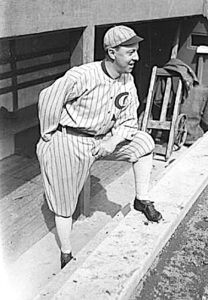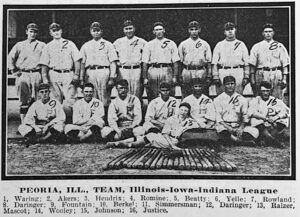
Clarence ‘Pants’ Rowland managed the Chicago White Sox from 1915-18. He led the ChiSox to the 1917 World Series title, and left the team before its infamous ‘Black Sox’ season of 1919. Rowland got his big break after managing the Peoria Distillers in 1914.
You know what a once-in-a-lifetime achievement is?
An achievement.
Days ago, the Peoria Riverfront Museum announced a new initiative, “Peoria Sports Legends,” with help from former Journal Star colleague Kirk Wessler, who led PJS’ sports department.
So it’s a new time to recall greater Peoria’s place in sports, and that should include those overlooked while stars like baseball’s Jim Thome and Joe Girardi, basketball’s Shawn Livingston and Curley “Boo” Johnson, and others less familiar are honored.
Like Clarence “Pants” Rowland, who I first wrote about 12 years ago.
One hundred and five years ago, the National Pastime was tainted by Chicago’s talented White Sox losing games for money. But few realize that the corrupted “Black Sox” had been shaped in part by a one-time Peorian with no major league experience: Rowland, who used his savvy and small-town manners to win a World Series and influence professional baseball for decades.
Born in 1878 in Wisconsin, Rowland grew up in Dubuque, Iowa, where as a youngster he reportedly earned his nickname from someone teasing him for wearing baggy hand-me-down trousers. A young catcher, he organized a sandlot baseball team, a semipro club, and in his twenties persuaded the Illinois-Iowa-Indiana (“Three-I”) minor league to give him a franchise in Dubuque.

‘Pants’ Rowland (No. 7, second from right) managed the Peoria Distillers to second place in the Three-I in 1914 with an 87-56 record.
Pants apparently never played in games (except as a pinch-running player-manager, he said), but he managed minor league squads in 17 summers, compiling a .496 winning percentage — including with the 1914 Peoria Distillers, when they finished second with an 81-56 season after two years of 56 and 57 wins.
“An amiable, gregarious gentleman,” according to New York World-Telegram sportswriter Joe Williams, Rowland also ran “a pleasant taproom in Peoria.”
Taproot
Indeed, city records from 1914 show Rowland working in the Distillers’ office in the Jefferson Building, at Lake View ballpark on NE Adams and Grant (now owned by the Peoria Park District), and at 324 SW Washington, which may have been the tavern, an apartment, or both. The White Sox noticed.
According to the New York Times, Three-I League president Al Tierney said Rowland was “one of the most businesslike managers in baseball, and, given a fair chance, would be certain to make his mark in the major leagues.”
Others said it was Rowland’s taproom. “Ban Johnson, president of the American League, and Charley Comiskey, [Sox] owner, patronized his place on hunting junkets during the winter,” Williams wrote.
Comiskey — who’d also helped Rowland stock his Dubuque team years earlier, hired Rowland as Sox manager in December 1914, after the Sox finished in sixth place.
“Certainly, it was the most daring experiment a club owner ever made,” Williams recalled. “Astonishingly, it proved to be a stroke of genius.”
And how. Directing the 1915 Sox, rookie manager Rowland piloted the team to third place — the highest the club had finished in eight years. That quieted critics who sneered at Comiskey for “digging a manager out of the bushes.”
With Rowland’s advice, the Sox rebuilt, finishing third in 1915 and second in 1916. By 1917, Pants’ core included “Shoeless Joe” Jackson, “Happy” Felsch and Buck Weaver, and they won 100 games and the pennant. Eight of Rowland’s stars later would be implicated in the Black Sox scandal, but Rowland became the first skipper in the 20th century to win a pennant without big league playing experience.
Consumate pro
Despite his leadership, Rowland wasn’t fully accepted. Some blamed his quiet, humble demeanor and others an “even-handed approach to management” that avoided controversy.
“Rowland was a true leader,” the Associated Press said. “He never bawled a player out for a mistake or tried to rile his players hoping for a better effort. He cajoled and jollied his men.”
In the 1917 World Series, the team defeated the New York Giants — managed by legendary John McGraw — four games to two.
“About all Rowland had to do was to make out the batting order and name the starting pitcher,” Williams wrote, “although when he had to make pitching changes or send up pinch hitters, it seemed that his judgment was every bit as sound as that of other managers held in greater awe.”
In fact, says baseball historian Bill James, Rowland was an early advocate of platooning — playing right-handed batters to face left-handed pitchers, and vice versa.
“If you look at the Giants’ lineup,” James notes, “it’s basically a right-handed-hitting lineup, so that may imply that Pants Rowland in 1917 was selecting his starters with recognition of the platoon advantage.”
Respectable
The White Sox Encyclopedia reports a World Series incident that exemplifies a modest attitude that encouraged some to attack Pants, described as “diplomatic to the extreme”:
“Always the gentleman, manager Rowland extended his hand in friendship to Giants manager John McGraw following the last out,” it’s written. “[He said,] ‘Mr. McGraw, I’m glad we won, but I’m sorry you had to be the one to lose.’ McGraw frowned: ‘Get away from me you damned busher!’ Such was the level of respect.”
In 1918, Jackson, Felsch and other stars were pressed into service for World War I, and the Sox finished sixth; Rowland was fired on New Year’s Eve, replaced by player/coach “Kid” Gleason for the infamous 1919 season.
Pants stayed in baseball, managing in the minors and becoming an American League umpire for five seasons.
However, umping “went against his grain of conviviality,” the New York Times reported. “His suit was the administration of affairs and managing men.”
So he did, leaving umpiring to manage the Southern Association’s Nashville franchise.
Then Rowland became a top scout for the Chicago Cubs in the 1930s, working as a scout and administrator for the Cubs until 1944, when he became president of the Pacific Coast League for 10 years. Rowland then returned to the Midwest, where he resumed duties with the Cubs as an executive.
He “served the Cubs for almost as long as [equipment manager Yosh] Kawano in a variety of jobs,” wrote Chicago sportswriter Jerome Holtzman, “ranging from scout to vice president and unofficial assistant general manager.”
Rowland died at the age of 91 in Chicago on May 17, 1969, an honorary vice president of the Cubs (who were in first place that day). And Rowland’s MLB record of 339-247 gave him a .578 winning percentage, just behind McGraw’s .586.
Let’s hope at some point Pants — a Peorian, if briefly — is remembered at the Peoria Riverfront Museum, which is located one block from Rowland’s tavern.


Recent Comments